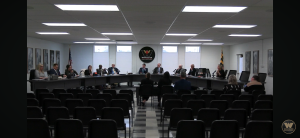Members of the Worcester County Board of Education discussed a plan last week to secure funding to continue the system’s elementary, middle and high schools’ summer academies as COVID money dries.

The Worcester County Board of Education discuss funding for summer academy programs during a meeting Feb. 13.
Photo courtesy Worcester County Board of Education
By Tara Fischer, Staff Writer
Members of the Worcester County Board of Education discussed a plan last week to secure funding to continue the system’s elementary, middle and high schools’ summer academies as COVID money dries.
Coordinator of Instruction Tamara Mills detailed finances required for the program during a budget work session. Before COVID, she said, the local government funded the summer sessions for Ocean City Elementary School, Berlin Intermediate School, Stephen Decatur Middle School and Stephen Decatur High School. Grants funded the other schools’ summer academies. The program was able to service over 1,100 students across the county each summer over the last three years, as opposed to the traditional 700 to 900.
Mills explained that the depleted aid package from pandemic programs would force WCPS to request $377,700 from the county commissioners to support the northern school’s summertime programs. They will also pursue additional avenues of monetary support, such as the Donnie Williams Foundation Grant, from which they requested $150,000.
Most of the locally requested money, roughly $264,000, is intended for staffing, fixed charges, materials of instruction, and a small amount for incentives and field trips. At the same time, $49,500 will be used for bus contractor expenses. Additionally, $64,200 is planned for employing the schools with a registered nurse.
“We knew already with losing some COVID funding that we would have to scale back,” Mills said. “Even the grant-funded schools will see a decrease because they only have the one grant, whereas in the past they maybe had two or three grant sources.”
OCES had 12 teachers and four educational assistants across five grade levels for their summer academy last year. Mills said that for the upcoming session, they are only requesting seven educators and hope that it is still a realistic figure to service all the students who benefit from the program.
The summer academy budget issues have also presented challenges for Extended School Year, or ESY, services. ESY provides amenities such as academic, physical, and speech therapy and life skills to kids with Individualized Education Programs during the break. There is no cost to parents; it is mandated by the Individuals with Disabilities Education Act and the Code of Maryland Regulations.
Mills worries that if the northern schools cannot host summer academies, the 142 ESY students would have to be bussed to a grant-funded school, like Snow Hill Middle, increasing the ask for transportation and disrupting the ability to estimate costs.
Board of Education President Todd Ferrante reiterated the importance of adequate transportation. Given the northern schools’ proximity to Ocean City, parents are busiest in the summer and may be unable to drive their children to the program. Eliminating support from this area would only hurt the kids that benefit the most.
“Our north end has fewer students living in poverty,” Mills said. “But that doesn’t mean they don’t have any. Even though OCES may not reach the threshold as an entire school to have free meals during the school year, their summer program was at least 50% economically disadvantaged, which allowed them to get those free meals for the summer. Knowing that, transportation is critical. If we do not provide the transportation, it is an equity issue. That says that only the students whose parents have a way to get them to and from are the ones who can take advantage.”
The summer academy is vital to many students’ success, Mills said. The program includes 90 minutes of literacy and an hour of math daily. Time is also blocked out for art, gym, and music classes.
“Summer academy is designed to look a little different from regular instruction,” Mills said. “With students in fourth grade and up, we compete with summertime to get students there.”
